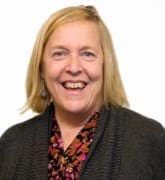Even though “Bill” showed up right on time for Boston’s Third Surge to End Chronic Homelessness, he told me that he “thought it was going to be stunt, a lot of talking but nothing to show for it.” But when Bill left the building — some seven hours after I greeted him as his assigned ambassador for the day — he had plenty to show for his efforts: a doctor and an appointment, an insurance provider, and best of all his own apartment. It was clear that this was no stunt but an incredible collaboration between the Commonwealth of Massachusetts, the City of Boston, and lots and lots of providers and volunteers.
Behind the Scenes
In many ways, an event like this is just plain old common sense: Bring together all the players — MassHealth/Medicaid, Social Security, the Boston Housing Authority, the Metropolitan Boston Housing Partnership, accountable care organizations, homeless service providers, housing navigators, and the people who need what all of them have to offer — to resolve the barriers that have kept Boston’s chronically homeless individuals from finding and keeping housing. But that view is just like looking at the face of the watch and not seeing all the intricacies that hide behind it.
Led by the Massachusetts Department of Elder Affairs and Boston’s Department of Neighborhood Development, the Boston Surge was the product of months of detailed planning and collaboration. Data was shared between MassHealth and homeless shelter and outreach providers, and matched to identify individuals over age 50 who had been living on the streets or in homeless shelters for a year or more or who had experienced homelessness several times over the past few years. Some of these individuals were currently on Medicaid while others had previously been, but were no longer active. For the Third Surge, 124 individuals were invited and encouraged and supported to participate. Meanwhile, the Boston Housing Authority and the Metropolitan Boston Housing Partnership looked through their portfolios of housing units and subsidies to identify available housing resources. An individualized “passport” with potential options of health care and support services was created for each person before the event.
The Big Day
Finally, on the day of the Surge, the teams arrived. Representing Social Security, MassHealth, the Housing Authority, service providers, and accountable care organizations, they brought computers, printers, and a determination to get the job done. Ambassadors (all volunteers like myself) were each connected to one “guest” and walked them through the process. The day was busy, chaotic at times, but filled with an energy and a collective sense of will to get people housed. There were no photo ops, no speeches — there was too much work to do.
More than half of the people experiencing chronic homelessness who had been invited — a strong turnout — came to the event. Bill and I got to know one another over breakfast. A Boston native, he fell on hard times two years ago, lost his housing, and had been living in a shelter ever since. On the spot, we got Bill’s social security documentation printed out. We met with several providers from senior care organizations, and he signed up for health services, supportive services, and a primary care physician.
Next, we filled out the Boston Housing Authority application and waited while staff reviewed Bill’s criminal background records and other eligibility requirements. We sat outside the room and smiled each time we heard clapping indicating that someone had received a housing unit. Then it was Bill’s turn. He was told he was eligible, and then got to pick a housing development that met his needs. The applause was for him this time. He sat there just saying over and over, “I thought this was going to be a stunt, I can’t believe it!”
Real Results
Boston’s Third Surge to End Chronic Homelessness produced impressive results. Forty-two elders left this one-day event with offers of apartments, while another seventeen have strong linkages to housing after a few more steps. MassHealth was able to re-enroll or upgrade coverage for 12 participants. And 62 elders are now engaged with supportive services to help them stabilize their health and housing for the long term.
The best news is that Boston’s model can easily be replicated. No big hero is required — or even stunt doubles. All it took to make it happen was the commitment of key individuals and agencies, along with plenty of hard work. I’m proud of Boston for coming together to end chronic homelessness, and I know your community can do it too.



